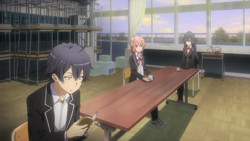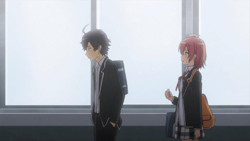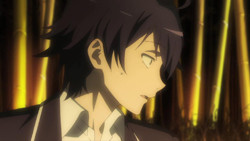 When an anime has as cutesy a title as My Teen Romantic Comedy SNAFU TOO! does, it's hard to believe that it is anything but the typical high school romantic comedy. However, as those who have seen the first season can attest, it's true. Transitioning perfectly into its second season,SNAFU TOO! is a refreshingly insightful series that, accompanied by its philosophically deep characters, adds a dark twist to the romantic comedy formula so that even those who normally avoid the genre can enjoy it.
When an anime has as cutesy a title as My Teen Romantic Comedy SNAFU TOO! does, it's hard to believe that it is anything but the typical high school romantic comedy. However, as those who have seen the first season can attest, it's true. Transitioning perfectly into its second season,SNAFU TOO! is a refreshingly insightful series that, accompanied by its philosophically deep characters, adds a dark twist to the romantic comedy formula so that even those who normally avoid the genre can enjoy it.This dark twist is first realized through Hachiman Hikigaya, a cynical, friendless loner drafted into the Service Club by his teacher in the attempt to brighten his personality. Working with the popular Yui Yuigahama and the also friendless Yukino Yukinoshita, he gradually becomes friends with them as they assist fellow schoolmates with their problems, but trouble stirs when his methods of helping begin to hurt himself in the process. It's then clear why "SNAFU," a military acronym meaning "Situation Normal: All Fouled Up," is part of SNAFU TOO!'s title.
 Many returning fans have been concerned about whether SNAFU TOO! can do justice to its incredible first season, especially since, as a result of switching animation studios, its art style has changed. Fortunately, these fears are unfounded; SNAFU TOO! is a natural continuation to the series that makes it feel like the first season never ended. The series picks up exactly where it left off, logically extending and intensifying the new conflict introduced in the previous season’s last episodes: Hachiman’s pragmatic, self-sacrificing methods. To ease back into the story after a two year break, however, it begins with a quick introductory arc to reacquaint viewers with the Service Club and Hachiman’s martyrdom so that the strain between the characters builds at a reasonable pace. Thus, even if SNAFU TOO! has a new, smoother look — one actually quite easy to adapt to — it is the same twisted romantic comedy everyone was hoping for.
Many returning fans have been concerned about whether SNAFU TOO! can do justice to its incredible first season, especially since, as a result of switching animation studios, its art style has changed. Fortunately, these fears are unfounded; SNAFU TOO! is a natural continuation to the series that makes it feel like the first season never ended. The series picks up exactly where it left off, logically extending and intensifying the new conflict introduced in the previous season’s last episodes: Hachiman’s pragmatic, self-sacrificing methods. To ease back into the story after a two year break, however, it begins with a quick introductory arc to reacquaint viewers with the Service Club and Hachiman’s martyrdom so that the strain between the characters builds at a reasonable pace. Thus, even if SNAFU TOO! has a new, smoother look — one actually quite easy to adapt to — it is the same twisted romantic comedy everyone was hoping for. At the center of SNAFU TOO!'s twisted romantic comedy is the characters, intriguing for their differing perspectives on life. Hachiman seems to be a logical, but bitter jerk, and this is where his tragic flaw lies; because he is kinder than both himself and others realize, as well as so convinced that people's negative opinions of him will never change, he continuously acts as the antagonist and sacrifices himself in order to solve problems without disrupting the status quo. This clashes with Yukino’s preference for difficult approaches that force people to face themselves and their friends, but ultimately result in people solving their problems and dealing with the accompanying changes rather than having someone take their problems away. These contrasting ways at first result in humorous banter, but as the conflict escalates, Hachiman and Yukino’s relationship is stretched to its limits. Attempting to keep the club together is Yui, the seemingly typical popular girl whose bright perspective is not made the enemy of the other two’s unconventional views, but rather is portrayed as necessary in combination with them. The depth of SNAFU TOO!’s characters is enough that people should marathon the first season and quickly catch up with this one.
At the center of SNAFU TOO!'s twisted romantic comedy is the characters, intriguing for their differing perspectives on life. Hachiman seems to be a logical, but bitter jerk, and this is where his tragic flaw lies; because he is kinder than both himself and others realize, as well as so convinced that people's negative opinions of him will never change, he continuously acts as the antagonist and sacrifices himself in order to solve problems without disrupting the status quo. This clashes with Yukino’s preference for difficult approaches that force people to face themselves and their friends, but ultimately result in people solving their problems and dealing with the accompanying changes rather than having someone take their problems away. These contrasting ways at first result in humorous banter, but as the conflict escalates, Hachiman and Yukino’s relationship is stretched to its limits. Attempting to keep the club together is Yui, the seemingly typical popular girl whose bright perspective is not made the enemy of the other two’s unconventional views, but rather is portrayed as necessary in combination with them. The depth of SNAFU TOO!’s characters is enough that people should marathon the first season and quickly catch up with this one. As a result of these philosophically varied characters, SNAFU TOO! reworks the romantic comedy genre to be much darker and more insightful than usual. Due to Hachiman's sardonic nature, much of the comedy comes from his blunt, bleak musings of others' behaviour and desire to fit in, as well as his surprisingly lighthearted moments of attraction to his closest male friend. Moreover, blatant romance is not the series's central focus, but rather the subtle development of it through deepening friendships that lay the foundation for stronger, more realistic romance later on. This well-developed romance in combination with dark humour results in an anime that makes several points about philosophical issues under the guise of comedy, prompting viewers to think critically about life.
As a result of these philosophically varied characters, SNAFU TOO! reworks the romantic comedy genre to be much darker and more insightful than usual. Due to Hachiman's sardonic nature, much of the comedy comes from his blunt, bleak musings of others' behaviour and desire to fit in, as well as his surprisingly lighthearted moments of attraction to his closest male friend. Moreover, blatant romance is not the series's central focus, but rather the subtle development of it through deepening friendships that lay the foundation for stronger, more realistic romance later on. This well-developed romance in combination with dark humour results in an anime that makes several points about philosophical issues under the guise of comedy, prompting viewers to think critically about life.A long-awaited second season that makes it feel like the first one never ended, My Teen Romantic Comedy SNAFU TOO! does incredible justice to its first season and, rather than idealizing high school life, remains intriguing through its two greatest strengths: its philosophically contrasting characters and its unique take on the romantic comedy genre. If you're looking for an insightful series with a dash of love and humour, look no further than to the Service Club to help you.
0 comments:
Post a Comment